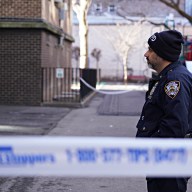Nearly 1,000 doctors at four NYC Health + Hospitals (NYC H+H) facilities are ready to go on strike this month if their contract demands are not met, the Doctors Council-Service Employees International Union (SEIU) announced on Thursday.
The frontline physicians work in various departments, including emergency medicine, at NYC H+H medical centers. The union said on Jan. 2 that they plan to strike on Jan. 13 if their demands are not met; a work stoppage could result in patients experiencing longer-than-normal waits for care and treatment.
The doctors, all affiliated with NYCHH and the private sector groups Physician Affiliate Group of New York (PAGNY) and Icahn School of Medicine at Mount Sinai, are set to walk off the job from Jacobi Medical Center, North Central Bronx Hospital, Queens Hospital Center and South Brooklyn Health.
The union doctors said they have been fighting for a contract since September 2023 that “provides sufficient resources for the hospitals to be competitive in a highly tight medical job market.” They are also advocating for salary adjustments in their contract in what they proclaim to be an effort to keep their jobs competitive and “ensure the hospital system retains high-quality doctors.”
A national shortage of doctors has led to a market where physicians working in the public healthcare system are often drawn to the private sector for dramatically higher pay, a union spokesperson said.
Some doctors have said that while negotiations with their employers have stalled, other physicians are facing employer cuts to their benefits — including a 20% reduction in sick leave.
“We are on the front lines of healthcare every day, working tirelessly to provide the best possible care to our communities,” said Dr. Joplin T. Steinweiss, DO, a primary care physician at Jacobi Hospital. “But Health and Hospitals and its affiliates are failing to offer a contract that addresses the rising costs of living, the long hours we work, and the increasing stress and burnout we face as our hospitals struggle to recruit and retain qualified doctors.”
The doctor stressed the need for the contract in the face of a shortage of physicians.
“Without a fair contract, our communities will continue to face a critical shortage of doctors, and patients will ultimately bear the brunt of the system’s failure,” Steinweiss said.
amNewYork Metro reached out to NYC H+H for comment and inquire about patient contingency plans during the possible strike. A spokesperson provided a statement:
“We value physicians who serve patients at NYC Health + Hospitals every day. We continue to encourage all parties involved to work together at the bargaining table to prevent a strike and ensure that quality care remains uninterrupted for our patients.”
The private affiliates did not respond to requests for comment.
The Doctors Council filed several “unfair labor practices,” known as ULPs, with the National Labor Relations Board. The union’s ULPs include refusal to bargain over key areas of compensation, and an unlawful premature declaration of impasse, and unilateral implementation of an offer “the vast majority” of Doctors Council bargaining committee members found unacceptable.
The union also brought its demands to the public spotlight during a rally outside Jacobi Medical Center on June 14, when it said it was facing high rates of burnout and turnover that affected patient care.
During the rally, doctors discussed how both patients and doctors suffer the harmful effects of long shifts, frequent turnover, some delayed medical procedures and long wait times.
Meanwhile, Doctors Council SEIU members said they are not taking the decision to strike this month lightly.
“But we have been negotiating in good faith for over a year to reach an agreement that addresses the crisis of dedicated doctors leaving our hospitals, but it’s clear our employers are not prioritizing the long-term health of these hospitals or our communities,” Dr. Frances Quee, MD, a pediatrician at Health and Hospitals Gotham Health, Blevis and president of the Doctors Council SEIU. “Our patients deserve the highest quality care, and we need a contract that supports the doctors who are integral in providing it.”
Read More: https://www.amny.com/new-york/






































